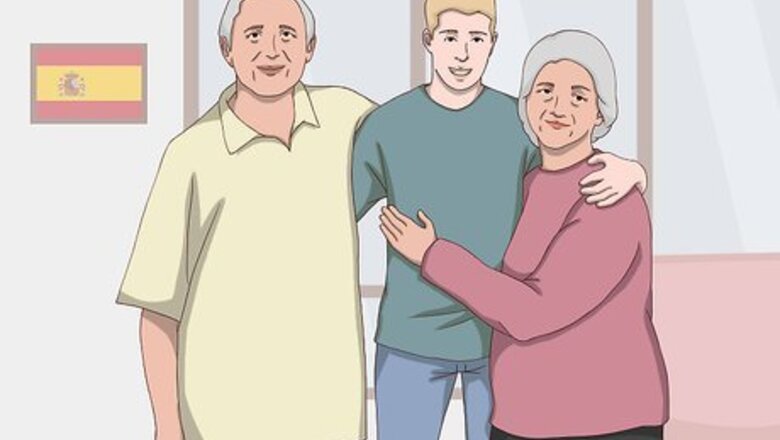
views
Determining Your Eligibility
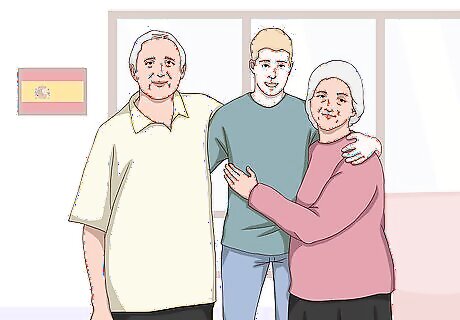
Check to see if you are eligible to apply by ‘Option.’ The easiest way to become a Spanish citizen is to have Spanish heritage. If one or both of your parents are from Spain, chances are you’re eligible to apply for Spanish citizenship by ‘Option,’ meaning you don’t have to meet the requirements applicable to people with no connection to Spain. You’re eligible to apply by ‘Option’ if you: were born in another country to a Spanish parent were born in Spain to foreign parents, but at least one of them was also born in Spain are married to a Spanish national
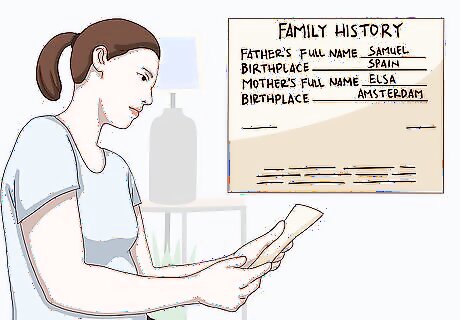
Figure out if you’re exempt from the 10-year residence requirement. People who can’t apply for Spanish citizenship by ‘Option’ are required to live in Spain for 10 years before applying to be naturalized, but in some cases that period is shortened. You may not have a parent who’s Spanish, but there are other ways in which you might have a strong connection to Spain. You may be exempt from the 10-year residence requirement if you: were legally adopted by a Spaniard were born in Spain to foreign parents, but their nation of origin is unknown or they are refugees are from Andorra, the Philippines, Equatorial Guinea, Portugal, or a Spanish-American country (residence requirement: 2 years) are descended from Sephardic Jews who were driven from Spain.

Consider how your EU status might affect your application process. Citizens of the EU can move between EU states relatively freely. If you’re an EU national, you can live and work in Spain without needing work or residence visas, though you will still have to live in Spain 10 years if seeking citizenship. Non-EU citizens must go through a few extra steps; after 5 years in Spain, they must become legally recognized permanent residents. The status of British expats living in Spain is still unclear in the aftermath of Brexit. If you’re already living there, it’s likely you’ll be granted permanent residency rights similar to those granted to non-EU nationals who’ve lived in Spain the requisite 5 years. Depending on how long you plan to stay in Spain, you may need to apply for citizenship in the future.
Becoming a Permanent Resident

Get a residence card when you first move to Spain. Non-EU citizens may visit Spain for up to 90 days on a tourist visa, but if your intention is to live in Spain long-term, you must apply for a residence card within 30 days of arriving in the country. You have to get it renewed every year, proving each time that you’re financially stable and independent. To get the card, go to a police station or designated office and be ready to submit the following documents: Photocopies of your passport Proof of your current address in Spain Work contract or other reason for residency A financial plan for how you will support yourself
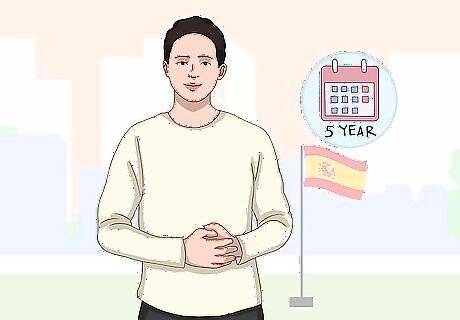
Live legally in Spain for 5 consecutive years. If you’re a non-EU citizen who’s lived in Spain for 5 years, you can apply for an EU long-term residence permit. This document allows you to live in Spain indefinitely, while granting you many of the same rights as Spanish and EU citizens, including: right to work in an EU state educational and vocational training health assistance and other central benefits access to goods and services.

Apply for an EU long-term residence permit. Non-EU nationals have to meet a higher standard than EU citizens to be allowed to live and work permanently in Spain. After you’ve lived in Spain for 5 years, you’ll need to prove that you support yourself financially, and that your residence over the past 5 years has been legal. To get the permit, go to the Civil Registry closest to you and be prepared to show the following: a pension, scholarship, or salary proving you’re financially stable health insurance from a company authorized to operate within Spain a valid passport rental contract, receipts for rent, or other documentation proving you’ve legally lived in Spain certificate of a clean criminal record issued from your home country official documents recognizing your marital status, if married or divorced

Stay in Spain or risk your permit being revoked. If you want to become a citizen, you must live in Spain an additional 5 years after gaining permanent resident status before you can apply. You’ll lose your long-term residence permit if you live outside of Spain for more than 2 consecutive years.
Applying for Spanish Citizenship

Reside legally in Spain for 10 years. When you don’t have Spanish heritage, the Spanish government wants to be sure that you are really committed to Spain before it grants you citizenship. The 10-year residence requirement helps them know you’re serious about staying. Once you’ve lived in Spain for a decade, you’re eligible to be naturalized as a full Spanish citizen, putting you on equal legal footing with people born and raised in Spain. That means you’ll finally have the right to vote in Spanish and EU elections. When you apply for full Spanish citizenship, the authorities will determine whether or not you’ve sufficiently integrated into Spanish society. That means that they’ll want you to speak Spanish and to have taken part in festivals, traditions, and cultural rituals that are part of the Spanish way of life. They’ll also want you to prove that you’re a ‘good citizen,’ i.e., you have no criminal record, you’re financially stable, and you pay taxes.

Take a DELE language exam and score a minimum CEFR A2 in Spanish. DELE, or Diplomas de Español como Lengua Extranjera, are permanently-valid diplomas issued by the Spanish government to people who pass a standardized language test. Unless Spanish is your first language, you’ll need to score at least an A2—“low intermediate.” You’ll be issued a certificate verifying your results, which you’ll need as part of your citizenship application materials. DELE offers exams 6-7 times per year, but you’ll have to register in advance https://examenes.cervantes.es/es/dele/cuando. The exam costs between 100€ and 200€ to take.

Pass the CCSE exam. The constitutional and sociocultural knowledge test of Spain, or CCSE test, is a 25-question multiple choice exam testing your general knowledge of Spanish culture and law. It’s administered by the same ministry of the Spanish government that runs the language exams, but it only costs 85€. The CCSE exam is offered once a month at every Instituto Cervantes center, and you can expect results back within 3 weeks.
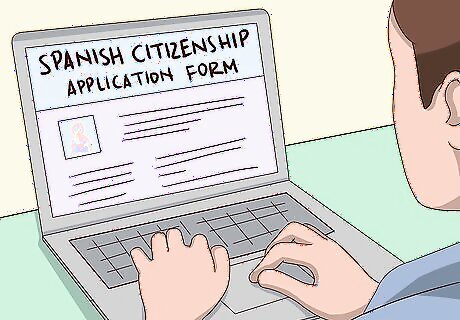
Fill out the Spanish citizenship application form. You can complete the form entirely online through the SEDE electrónica, or in-person at your local Civil Registry. Its questions are fairly straightforward: simply write down your name and information, plus why you’re applying for Spanish citizenship. Even if you fill out the form online, your Civil Registry will most likely contact you for an in-person appointment before your application materials can be approved.
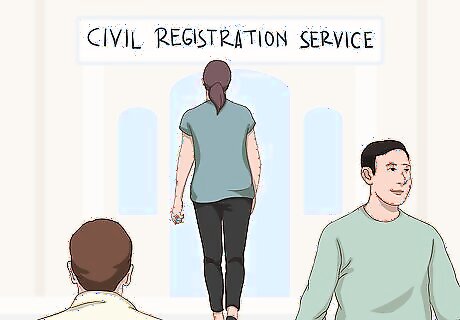
Bring supporting documents to the closest Civil Registry. The citizenship application form is only one piece of the documentation you’ll be asked to supply. Plot out at least three months to acquire all the requisite certificates and forms before you make the trip to the Civil Registry. When you do go, be prepared to show the following documents: citizenship application form DELE diploma with a score of A2 or higher CCSE exam with a passing grade original and photocopy version of a valid TIE (tarjeta de identidad de extranjero) original and photocopy version of each page of your passport birth certificate, printed within the past 90 days and with sworn translation attached (if not printed in Spanish) clean criminal record or background check issued from your home country within the past 90 days, with a sworn translation attached Spanish criminal record certificate, printed within the last 90 days government registration certificate, printed within the last 90 days application payment of 100€

Wait to hear back on the status of your application. Unlike with visa and residency requests, the Spanish government has no solid time-frame for deciding on citizenship applications. It may take anywhere from 18 months for 4 years to receive an answer, so be patient and make sure you’re still legally allowed to live in Spain in the meantime.


















Comments
0 comment